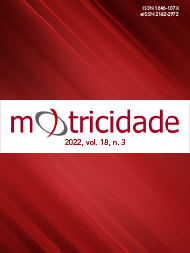Perceived motor competence in children from two different perspectives: children and family
DOI:
https://doi.org/10.6063/motricidade.25208Keywords:
self-perception, foundational motor skills, preschool, gender, parents’ perceptionAbstract
Perceived motor competence (PMC) is fundamental in early childhood because of its relationship with motor competence (MC) development. Therefore, the aims of the present research were: to analyse children's PMC from their own and their parents' perspectives, to test for gender differences, and to assess the possible association between children's PMC and their parents' perception. The sample consisted of 22 children in the third kindergarten year (M= 5.27, SD= 0.45) and their respective parents. The results showed higher scores for girls in the scales’ patterns, except for object control. The girls also scored higher on all dimensions from parents, with significant differences in parents’ perception of fine motor skills in their favour. No relevant data were found on the relationship between the children's PMC and parents´ perception. It can be concluded that girls' perception is higher than boys’ and that girls are perceived as more competent by their parents. However, the lack of correspondence between children's and parents' perceptions makes it necessary to be cautious and consider that participants may not be accurate in their assessments due to their age.
Downloads
Published
Issue
Section
License
The authors of submitted manuscripts must transfer the full copyright to Journal Motricidade / Sílabas Didáticas Editions. Granting copyright permission allows the publication and dissemination of the article in printed or electronic formats, and copyrights start at the moment the manuscript is accepted for publication. It also allows Journal Motricidade to use and commercialise the article in terms of licensing, lending or selling its content to indexation/abstracts databases and other entities.
According to the terms of the Creative Commons licence, authors may reproduce a reasonable number of copies for personal or professional purposes, but without any economic gain. SHERPA/RoMEO allows authors to post a final digital copy (post-printing version) of the article on their websites or on their institutions' scientific repository.


